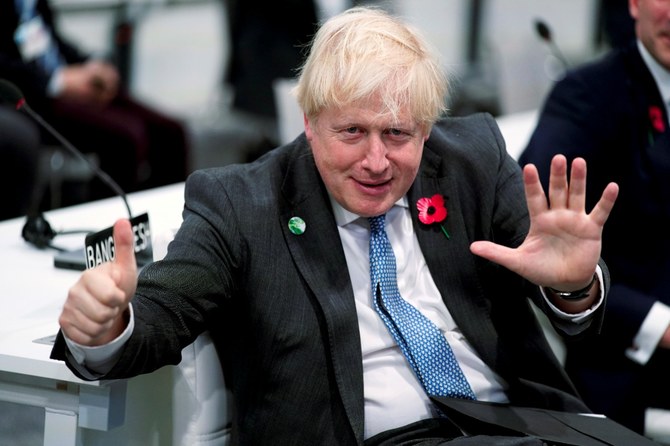GLASGOW: The UN climate summit in the Scottish city of Glasgow witnessed “the first big achievement” on Tuesday as over 100 countries pledged to take steps to end deforestation, cut methane emissions and help South Africa wean itself off coal.
The UK government said it has received commitments from leaders representing more than 85 percent of the world’s forests to halt and reverse deforestation by 2030. Among them are several countries with massive forests, including Brazil, China, Colombia, Congo, Indonesia, Russia and the US. More than $19 billion in public and private funds have been pledged toward the plan.
However, British Prime Minister Boris Johnson warned against “false hope.” He said that the world must not think “in any way that the job is done, because it is not — there is still a very long way to go.”
“But all that being said, I am cautiously optimistic,” Johnson told a news conference.
Experts and observers said fulfilling the pledge will be critical to limiting climate change, but many noted that such grand promises have been made in the past — to little effect.
“Signing the declaration is the easy part,” UN Secretary-General Antonio Guterres said on Twitter. “It is essential that it is implemented now for people and planet.”
Deforestation, or land clearing for products such as palm oil, soy, and beef accounts for almost a quarter of the world’s greenhouse gas emissions. Previous deals to save the world’s forests, most notably in 2014, have failed to slow their destruction.
Dozens of countries joined a US and EU pledge to cut emissions of methane — a potent greenhouse gas — by at least 30 percent this decade, in a major commitment for climate action.
“One of the most important things we can do between now and 2030, to keep 1.5 C in reach, is reduce our methane emissions as soon as possible,” said US President Joe Biden, referring to the central goal of the 2015 Paris Agreement.
He called the pledge, which has so far been signed by nearly 100 nations, a “game-changing commitment” that covered countries responsible for around half of global methane emissions.
European Commission head Ursula Von der Leyen said that the methane cut would “immediately slow down climate change.”
“We cannot wait until 2050. We have to cut emissions fast and methane is one of the gases we can cut the fastest,” she said.
While the summit’s first day passed with much rhetoric but only lukewarm climate pledges, Tuesday’s twin announcements were broadly welcomed by campaigners.
The laundry list for COP26 remains daunting, however, with pressure on leaders to commit to faster decarbonization and provide billions to nations already dealing with the fallout of climate change.
Separately, the US, Britain, France and Germany announced a plan to provide funds and expertise to help South Africa phase out coal.
South Africa, which gets about 90 percent of its electricity from coal-fired plants, will receive about $8.5 billion in loans and grants over five years to roll out more renewable energy.
The announcements were not part of the formal negotiations taking place in Glasgow, but rather a reflection of the efforts by many countries to meet previously agreed targets.

























